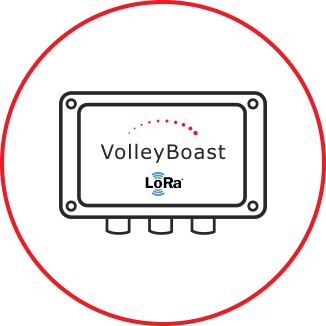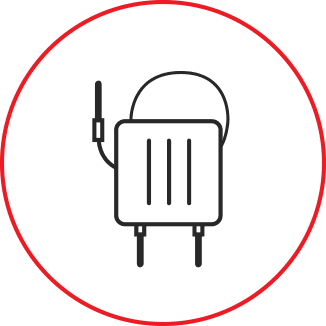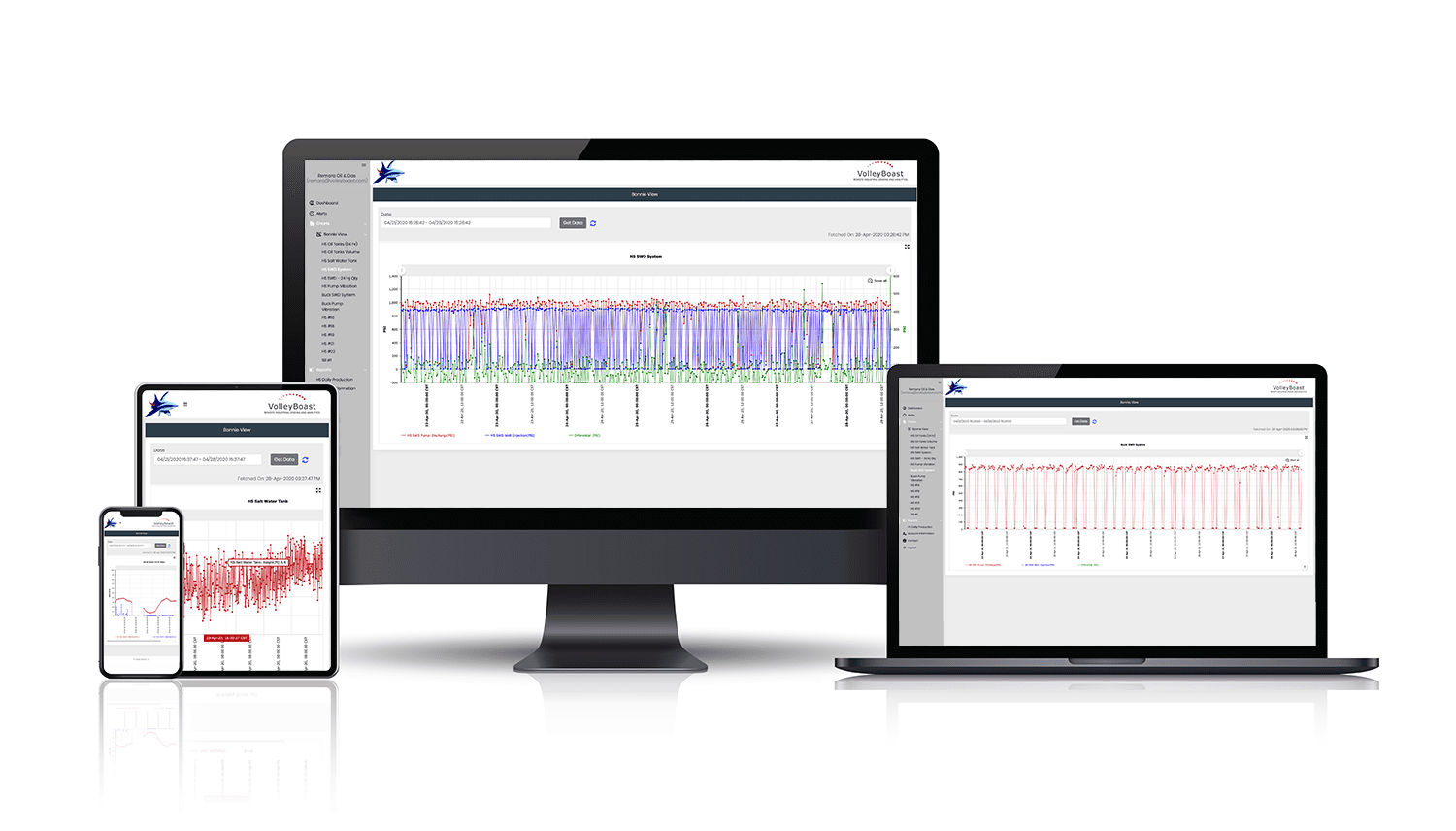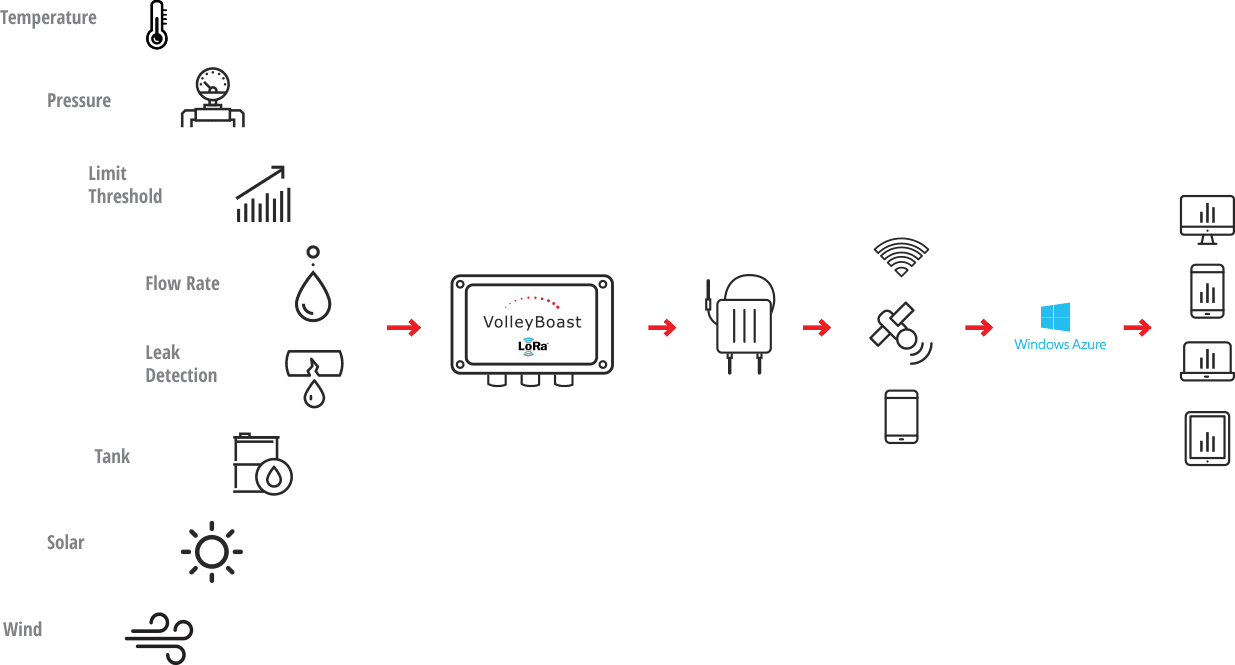Your data: anywhere, anytime, any device.
Your data: anywhere, anytime, any device.
Our monitoring service is a cost-effective way to collect and access data to improve both operations and the bottom line; helping you make faster, better informed business decisions.
HOW OUR MONITORING WORKS
Intermittent Data Collection
We help your business find the balance between continuous remote data sampling/monitoring and periodic manual visual inspection of operations. Typically, the transmission of periodic or hourly data provides the ideal amount of information to greatly improve operational KPIs while, at the same time, significantly reduces direct O&M expenses.
LoRaWAN
Volley Boast uses a very long range and very low power radio technology called LoRa to set up low cost wide area private networks known as LoRaWANs. Data from operations that were previously too expensive to monitor can now be cost effectively collected.
The standards for LoRa and LoRaWAN are overseen by the LoRa Alliance. Further details on the technology and related protocols can be found at https://lora-alliance.org.
KEY COMPONENTS

The VoBo
Our unique endpoint can work with nearly any sensor on the market, up to three sensors per node. The Node can be programmed to:
- Collect and transmit data on customer defined cycles
- Back up data locally
- Wake up out of cycle to take additional readings when triggered by an event
- Perform edge of network analytics

MultiTech Conduit
- Industrial grade IP67 models and indoor models
- Collects data from 10 to 100’s of VoBos
- Manages the network of VoBo Nodes
- Forwards the data to Azure Cloud over ethernet, cellular, or satellite transmission
Please visit MultiTech’s site to learn more about the Conduit

VoBo Customer Portal
- Built on Microsoft’s Azure cloud platform
- Sensor data stored in secure, redundant databases
- Custom analytics processed in the cloud
- Proprietary charts and reports per customer specs
- Alerts and alarms management
OPERATIONAL BENEFITS

Decrease operational expenses
- Minimize manpower spent on manual measurements and records
- Utilize algorithms to determine optimal preventative maintenance, minimizing downtime
Improve labor deployment
- Redeploy operating staff to manage higher functioning tasks
- Focus more time on problem solving, rather than maintenance
Reduce environmental impacts and improve safety
- Get notified more quickly about operating issues, respond faster
- Minimize operating employee drive times and accident exposure
Increase revenue
- Operators can fine tune and correct operating parameters to optimize processes
- Increasing the flow of information greatly improves facility availability, run time, crop growth and other key measurements
FREQUENTLY ASKED QUESTIONS
IoT stands for the “Internet of Things.” This is the idea that any device that uses power can be connected to the internet. There has been tremendous uptake for IoT for use with personal, retail, and, to a lesser extent, commercial applications. IoT has had less penetration into the industrial space primarily due to limiting factors associated with power management and connectivity.
No. The VoBo endpoint is designed to power sensors, process their signals, and communicate them to the gateway. Volley Boast can advise customers in choosing the appropriate sensor, if they do not already own them. Customers are responsible for installing and maintaining the sensors.
LoRa (short for “Long Range”) is the RF technology, and LoRaWAN is the protocol. Standards for LoRa/LoRaWAN are maintained by the LoRa Alliance.
LoRaWAN is part of a family called LPWAN (Low Power Wide Area Network). LoRaWANs can be managed as either public or private networks. Public LoRaWANs are operated by service providers (such as Actility, Helium, Orbiwise, and Senet) and allow customers to deploy LoRa enabled devices without having to worry about the gateways and all of the other network management issues. Private LoRaWANs are generally used by larger customers with the technological skills in house necessary to manage a network; such as Multitech’s LENS. Alternatively VolleyBoast can set up and manage private LoRaWANs through its Monitoring Service.
VoBos use 3.6 V Primary lithium-thionyl chloride batteries. The required number of batteries are provided with the VoBo, replacements may be purchased by the customer.
Battery life depends on a variety of factors such as types of sensors used, how long the sensors need to be powered to take an accurate reading, how often readings are taken, and a few other less determinant factors. Under most use cases, a single 13 Ahr battery will last 2 or even 5 years depending on the combination of these factors.
Yes, this requires a special configuration and is, therefore, more expensive. VolleyBoast does not offer this configuration “off the shelf” so please contact us if this is something you are interested in better understanding.
It is not recommended as there are better alternatives for accomplishing this. VoBos can be deployed on equipment that is mobile as long as it remains in range of a gateway when it is operating.
SCADA (“Supervisory Control And Data Acquisition”) systems generally require constant power and are well-suited for large, complex industrial operations requiring real-time, continuous two-way communication. LoRaWANs, alternatively, are best used in situations requiring intermittent communication with measurement endpoints and when information can be adequately conveyed in small data packets. Both SCADA and LoRa have their respective places in the industrial world and really function best when working together. With LoRa we can make data available directly to the customers business systems or data lake.
To date, there has been significant uptake for LoRa devices in the consumer, retail, and commercial sectors. Solutions for industrial applications provided by other vendors typically integrate LoRa functionality into the sensor. This restricts the sensor choices available to the customer.
No. VoBos can be used with any LoRa Alliance certified networks. There are several public networks in operation that may have coverage in the area of interest
Design modifications are being implemented for certification for location in Class I/Division 2 hazardous areas in the US and to be able to connect with most Intrinsically Safe sensors.
Yes. VoBos come with default settings. Customers can change these settings remotely over the cloud through our customer portal or locally with a custom RS-232 cable.
Absolutely. As long as you comply with laws, code, and your particular industrial regulations, you can easily install VoBos on your own equipment. LoRa radios operate in the unlicensed radio spectrum, which means an FCC license is not required to operate a LoRa network.
Our current distributors are Digi-key and BiPOM Electronics. Corporate accounts and integrators: please contact us at info@vbstage2023.wpengine.com or call us at +1 250-412-5679.

